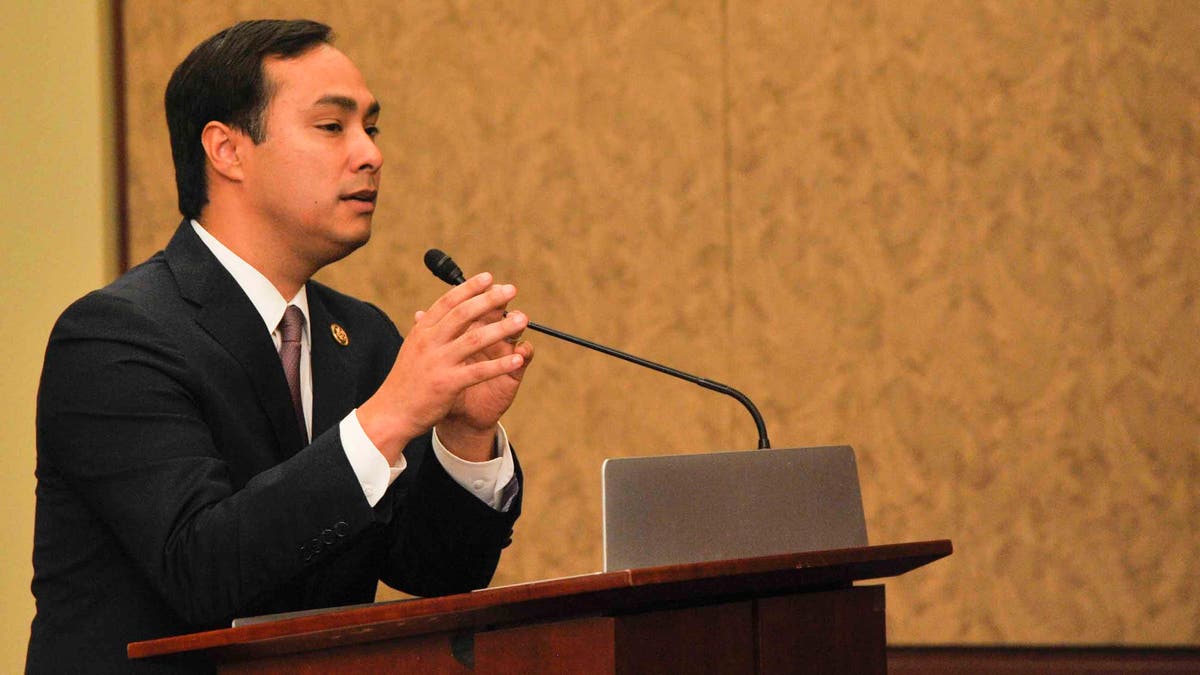
WASHINGTON, DC- SEPTEMBER 30: Representative Joaquin Castro(D-TX) speaks during a private screening of "Food Chains" in the Capitol Visitors Center on September 30, 2015 in Washington, DC. (Photo by Kris Connor/Getty Images for "Food Chains") (2015 Getty Images)
Washington – Rep. Joaquin Castro wants an end to the government’s use of the word “alien” to refer to foreign-born people living in the United States.
The Texas Democrat has introduced a measure to remove the term – which has been used in U.S. documents since the Naturalization Act of 1790 – from official U.S. regulations, laws, and documents, among other things.
In a statement about the measure, called the Correcting Hurtful and Alienating Names in Government Expression Act, or CHANGE, Castro said: “America is a nation of immigrants, yet our federal government continues to use terms that dehumanize and ostracize those in our society who happen to have been born elsewhere.”
“Regardless of status, immigrants to our nation are first and foremost human beings,” Castro said. “Removing the term ‘alien’ from our federal laws shows respect to our shared heritage and to the hundreds of millions of descendants of immigrants who call America home.”
A spokeswoman for Castro’s office said it is the first time there has been such an effort at the federal level.
The word alien has been targeted at the state level, such as in California, where earlier this year Gov. Jerry Brown signed a measure removing the term from the state’s labor code.
Among the modifications sought by the CHANGE Act are replacing the term alien with “foreign national,” striking “illegal alien” from federal law and replacing it with “undocumented foreign national,” and ensuring that all executive branch agencies stop using alien and illegal alien “in signage and literature.”
The U.S. government uses the term alien to refer to a person who is not a citizen or national of the United States.
Castro’s office says that since the term was first used centuries ago “the term has taken on a highly negative connotation.”
Indeed, it has been the focus of intense debates between those who favor strict immigration policies and those who prefer more leniency.
“Words matter, particularly in the context of an issue as contentious as immigration,” said Castro. “Discontinuing our use of the term ‘alien’ will help lessen the prejudice and vitriol that for too long have poisoned our nation’s discussions around immigration reform.”
Advocates of more lenient immigration policies say the term diminishes the humanity and worth of immigrants and, by extension, encourages mistreatment of them. Many take exception to "illegal immigrant," also, saying "undocumented" or "unauthorized" should be used instead.
Proponents of strict immigration policies scoffed at the measure, and called it political correctness.
“Reshaping words to fit politically correct molds simply surrenders the language to those pushing an agenda and obfuscates facts and truth,” said Bob Dane, Executive Director of the Federation for American Immigration Reform, or FAIR, to Fox News Latino.
“The term ‘illegal alien’ is the most legally precise, descriptive term in the lexicon. It delineates between one of only two possible categories; one either has legal status to be on U.S. soil or one is residing here illegally. ‘Illegal’ means prohibited by law. Yes, entry without inspection into the U.S. is prohibited. And ‘alien’ is a term that refers to a person who is not a citizen of the country.”
Castro's office notes that official U.S. terms have been changed at other times to address the harm that language can have.
"Precedent exists for this type of terminology reform," a statement from the office said. "For example, the law has been changed to strike terms such as 'lunatic' (21st Century Language Act) and 'mentally retarded' (Rosa’s Law) from statute."
Advocates of more flexible immigration policies lauded the congressman’s legislation.
“As the congressman points out, words do matter and largely frames how we view an issue,” said Giancarlo Tello, a Rutgers University student whose activism on behalf of undocumented immigrants was pivotal in New Jersey’s passage of a law that allows them to attend college at in-state tuition rates. “Important to remember is that being unlawfully present in the U.S. without proper paperwork is actually a civil offense and not a criminal one.”
“You wouldn't call someone who illegally jaywalks an illegal, would you? By the same token you wouldn't call your uncle visiting from Germany an alien would you?” Tello said to Fox News Latino. “Words matter and all immigrants, both undocumented and those with temporary visas, should be treated as the fellow human beings they are.”












































